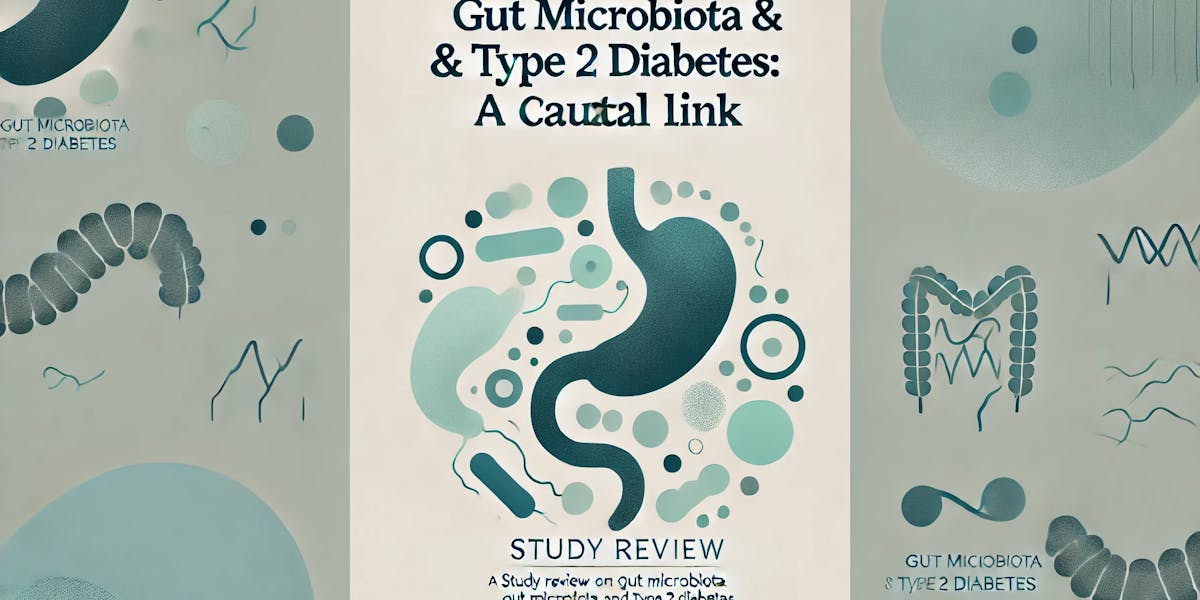Causal Link Between Gut Microbiota and Type 2 Diabetes
Frontiers in Public Health

Summary
This study explores the causal link between gut microbiota and Type 2 Diabetes (T2D) using meta-analysis and Mendelian Randomization (MR). It identifies specific gut bacteria that exhibit significant associations with T2D. The findings suggest that certain bacterial genera are positively or negatively correlated with T2D, shedding light on potential interventions for diabetes management. The research integrates genetic data from the GWAS database, analyzing gut microbiota variations in European populations. It applies MR techniques to establish causal links and assesses potential biases. Results highlight that certain gut bacteria, such as Haemophilus, are negatively associated with T2D, while Actinomycetes and Lactobacillus show a positive correlation. The findings provide valuable insights for future diabetes treatments based on microbiota interventions.
Study Design
Interventions
Study Type
Outcomes
Duration and Size
Study Population
Age Range
Sex
Geography
Other Criteria
Methodology
This study employs a three-part methodology: a systematic literature review for meta-analysis, data extraction from the GWAS database, and MR analysis for causal inference. The literature review assessed interventions in gut microbiota related to T2D. Statistical tests, including heterogeneity and bias assessments, were conducted.
Interventions
Interventions include gut microbiota modulation through probiotics and dietary changes. The study identifies bacterial strains that impact glycemic control and insulin sensitivity. Various microbiota genera, including Haemophilus, Actinomycetes, and Lactobacillus, are examined for their relationship with T2D.
Key Findings
The study identifies gut microbiota as a significant factor in T2D development. Haemophilus is negatively associated with T2D, while Actinomycetes and Lactobacillus show positive correlations. The findings suggest that microbiota interventions could be explored as a potential therapeutic avenue for managing diabetes.
Comparison with other Studies
Compared to previous studies, this research employs a comprehensive MR analysis, strengthening causal claims between gut microbiota and T2D. Unlike observational studies, this approach mitigates biases and provides stronger genetic evidence.
Journal Reference
Liu T, Cao Y, Liang N, Ma X, Fang J-a, Zhang X. Investigating the causal association between gut microbiota and type 2 diabetes: a meta-analysis and Mendelian randomization. Front Public Health. 2024;12:1342313. doi:10.3389/fpubh.2024.1342313
Related and Discussions
Are Bacteria The New Ozempic? Research Finds Promising Gut Microbe That Could Help Fight Obesity
How weight loss surgery reverses Type 2 diabetes: gut bacteria changes, not weight loss, may be key in diabetes reversal in mice and humans
Type-2 Diabetes Mellitus and the Gut Microbiota: Systematic Review
A systematic review and meta-analysis of gut microbiota in diabetic kidney disease
Gut microbiota and type 2 diabetes associations: A meta-analysis of observational studies
The Effect of Prebiotics and Oral Anti-Diabetic Agents on Gut Microbiota and Clinical Parameters in Adults with Type 2 Diabetes Mellitus: A Systematic Review and Network Meta-Analysis
Yale research finds that gut microbiota plays an important role in type 1 diabetes. Learn more about how gut bacteria become 'good' or 'bad'...
The gut microbiota and diabetes: research, translation, and clinical applications – 2023 Diabetes, Diabetes Care, and Diabetologia Expert...
A study in the Journal of Neuroinflammation suggests that gut microbiota dysbiosis participates in painful diabetic neuropathy pathogenesis...
Higher sugar-sweetened beverage intake is associated with gut microbiota alterations linked to an increased risk of type 2 diabetes...
Intestinal bacterial biomass and composition are associated with metabolic and inflammatory dysregulation evident before type 2 diabetes diagnosis...
Stay informed. Stay ahead.
Subscribe now for the latest breakthroughs, expert insights, and cutting-edge updates in diabetes care—delivered straight to your inbox.